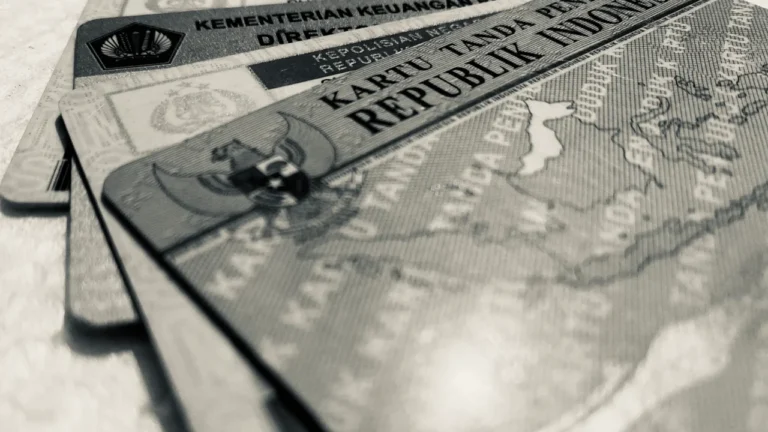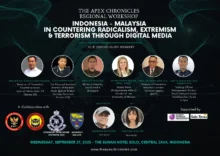Religion and Identity Politics in Indonesia and Malaysia

Religion and politics cannot be separated in the governance of Indonesia, as they mutually support each other. The presence of religion forms the basis of politics where belief in the One God and Only God, is the first Principle of the official foundation of the Indonesian State, Pancasila.
Combining religion with Politics does not always have negative effects. There are many examples of this harmony and cooperation on the local level. Interfaith dialogue and collaboration between different religious communities are encouraged by the government and civil society groups.
However, at times this combination often leads to problems, seen frequently during the general election (Pemilu), often these problems interfere with people’s political identity. Identity politics refers to political actions or beliefs that are based on a person’s specific identity, such as their race, gender, religion, sexual orientation, nationality or cultural background. In other words, identity politics is a way of organizing and mobilizing people around their shared experiences of oppression or marginalization due to their identity.
According to the records of the Election Supervisory Agency (Bawaslu), campaigns with divisive issues based on ethnicity, religion or race (SARA) and accompanied by hate speech were found during the 2019 election campaign. Some examples included using campaign posters and through social media (twitter).
The Indonesian National Police (Polri) are concerned about the mixing of identity and religion in political campaigns. General Police Listyo Sigit Prabowo, had warned that the presence of identity politics in the 2019 political campaign had left or generated some problems related to identity politics until now. Although the election has ended, the society is still divided.
“Without realizing it, there is currently a condition of the emergence of identity politics which certainly poses challenges, threats and we still face it until now,” said Listyo Sigit. He made this statement while signing a Memorandum of Understanding (MoU) with the Election Commission (KPU) at the end of December 2022.
By the end of 2022, President of the Republic of Indonesia, Joko Widodo, had warned everyone not to use identity politics and religious politicization in the upcoming 2024 general election. During a consolidation event with the Bawaslu, Jokowi hoped that there would be no tolerance for identity politics and religious politicization in the upcoming 2024 general election.
“We cannot relax with identity politics, religious politicization, and divisive politics. Do not give any space for them, as they are very dangerous. This can become an opportunity for other parties to divide our country’s unity and our unity as a nation,” Jokowi said in his speech.
The Use of Religion in Politics
Religion and identity politics have always been intertwined in Indonesia. With large Muslim populations, histories of colonialism and struggle for independence, Indonesia has grappled with the role of religion in the public sphere for decades. From the rise of political Islam to the challenges of religious diversity, the relationship between religion and politics in Indonesia is complex and multifaceted.
According to the latest data released by the Central Statistical Agency (BPS) of Indonesia in 2020, there were approximately 229,1 million Muslims in Indonesia out of 270,2 million total population. This data means that Muslims make up about 84,8% of the total population in Indonesia.
The fall of President Suharto’s authoritarian regime in 1998, paved the way for greater political openness and the emergence of Islamic political parties. The rise of political Islam in Indonesia has been a significant trend in recent years gaining popularity among voters.
Although the most popular case used as evidence on how religion influences politics was in 2016, when Basuki Tjahaya Purnama or popularly known as Ahok who was the governor of Jakarta made a statement during his campaign speech that criticized the use of Qur’an in political campaigns. Ahok is a Christian and also of Chinese descent, his statement was taken out of context, leading to accusations of blasphemy against him.
Islamic hardliners staged massive protests against Ahok, demanding that Ahok be prosecuted and jailed for insulting Islam. One of the renowned protests with the 212 movement happened on December 2, 2016.
Ahok lost the election as a result of the blasphemy accusations despite his popularity and accomplishments as governor, he was later found guilty of blasphemy and sentenced to two years of prison. This case highlighted the influence of religion in Indonesian politics.
Amin Mudzakkir, a researcher from the National Research and Innovation Agency (BRIN), believes that it is almost impossible to leave behind identity politics. This applies to all groups, not just religious ones but also secular ones, including those who advocate for nationalism. Identity politics has become one of the ways to eliminate political opposition. It is considered effective not only for those who use religious or faith identity but also for groups that have concerns about it.
“So, I read that the campaign to not use identity politics is actually part of that identity,” Amin stated.
According to Mudzakkir, if someone has ties to a particular identity, whether it is religious, their place of birth, language, or even in friendship, sometimes we cannot leave these identities, even when dealing with the public. Religion, according to modern political paradigms like in the United States and France, should be limited to private space, especially if it is related to electoral moments such as regional head elections or presidential elections.
People often forget that not only religious symbolism is used as an identity. Explicit nationalistic campaigns are also part of Political identity, but people rarely see these things. People tend to focus more on religion as the source of political identity. Meanwhile, other elements like race and ethnicity are rarely seen even though they also take part in political identity.
“In politics, there are main groups; Islamic groups and nationalist groups. These are both identity politics. The first refers to imagination about revelation or faith. The other concerns nationality, and it also has the potential to exclude or eliminate individual or social groups that are considered to contradict its fundamental values,” explained Mudzakkir.
Professor of Political Psychology from the University of Indonesia, Hamdi Mulluk, quoting the statement of the first Indonesian President, Sukarno, stated that from the beginning, Indonesia did not declare itself as a secular country, but also not a religious state. Therefore, there is no prohibition on bringing religious, ethnic, and the like identities to public spaces. The state also participates in matters related to the implementation of worship, such as the organization of the Hajj for Muslim communities. All religions in Indonesia are protected by the Constitution.
“With such recognition, you can establish a party that brings religious values. And that is legitimate under the Constitution,” he said.
The problem arises when certain parties politicize identity politics, mobilize religion and religious sentiments for political purposes, and make people hate other groups. “If this is done, it will only create intolerance, hatred between groups, and will trigger conflicts that result in different treatment of opposing groups,” said Mulluk.
Identity Politics in Malaysia
Like in Indonesia, politics, religion and race are quite inseparable in Malaysian society. It is ingrained in its political culture and become part of its political reality. Identity politics, which is defined as people identifies themselves with certain race, religion, culture, and political affiliation, also visible across the board, regardless whether they are Malays, Chinese, Indian and other ethnicities.
This phenomenon has emerged gradually during the pre-independence era, when the Malays rallied around the Sultan to fight against the British’s Malayan Union, an idea that they felt has compromised the Malay identity, position of Sultan and Islam in Malaya.
To achieve independence, three political parties representing three different ethnic groups came together to create National Coalition in order to form a stable government. United Malay National Organisation (UMNO), Malaysian Indian Congress (MIC) and Malaysian Chinese Association (MIC) represents the Malays, Indian and Chinese community respectively. The National Coalition, which later changed its name to Barisal Nasional include more parties representing different ethnicities from Sabah and Sarawak. This has deepened the idea of identity politics in Malaya during that time.
This form of political arrangement, on the basis of identity politics, did produce positive result. One of them was a stable government, in which all ethnic groups are politically represented in the government. Any political demands coming the grassroots are settled through negotiation and bargaining and it is conducted by the political elites.
“Certainly, political identity has benefits when all parties are working together despite their differences, said Kamarulnizam Abdullah, Professor of Security Studies at the National University of Malaysia. However, it becomes a big problem when they try to outdo each other. This thing can happen in many aspects, politics, economic, and religious matters,” he added.
James Chin, a professor of Asia Studies, University of Tasmania said, identity politics in Malaysia has another dimension that is the rise of political Islam and ideology of Malay Islam supremacy. This has caused ethnic divides, and fueled hate speech to non-Muslims.
Hate speech related to identity politics also can be seen among non-Malays related to the issue which are sensitive to Muslims and the Malays, especially related to ridicule of Islam, royal institution, and the issue of race. In 2019, Security Commission and Multimedia received 21,296 reports involved cases related to racism, religion and denigration of royal institution or 3R – race, religion and royalty.
In the recent interview by national television RTM in a program “Naratif Khas Bersama Perdana Menteri”, Prime Minister Anwar Ibrahim said, “We never recognize secularism, communism and LGBT (in Malaysia).” His mention of communism in this interview is clearly connected to certain group in Malaysia who still has intention to revive communist ideology, an ideology advocated by Communist Party of Malaya (CPM) led by Chin Peng. CPM has been disbanded after Baling Talks in 1955.
Realising the rising political temperature, newly appointed Prime Minister Anwar Ibrahim reminded Malaysians that the country belonged to all, even though special privileges had been accorded to the Malays and Bumiputeras.
“And I will use all the authority at my disposal to stop this madness, this insanity of going against other races and religions,” Anwar Ibrahim said in his speech at the PKR Congress in Shah Alam recently. “If you challenge this principle, you challenge us,” he added.
Anwar’s government came up with a new agenda known as Madani Approach, which he seeks to realise it in his administration. Madani approach consists of five values Sustainability, Prosperity, Innovation, Respect, Trust and Compassion.
In delivering his mandate themed ‘Developing Malaysia Madani’ here today, Anwar called on all his Cabinet members and civil servants to practice the core values in all administrative affairs. “I have high confidence that Malaysia will be able to rise again on the world stage, … we don’t want Malaysia to be polluted with scandals, problems and conflicts,” he said.
The Prime Minister added, “Malaysia Madani will restore Malaysia’s right to be known and respected as a prosperous nation.”



